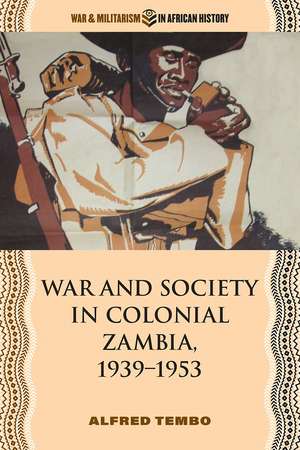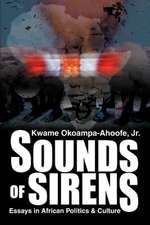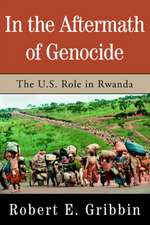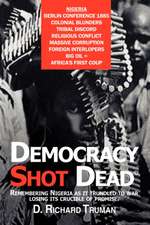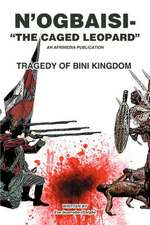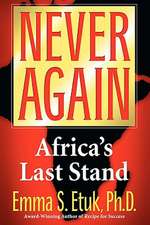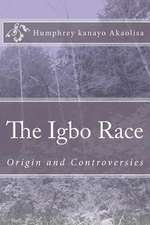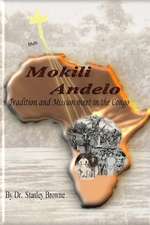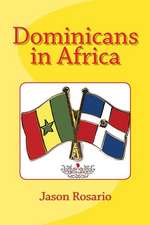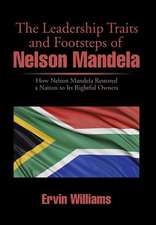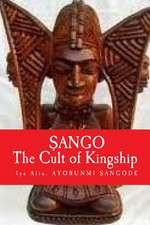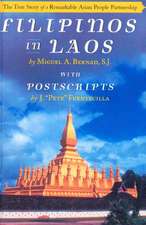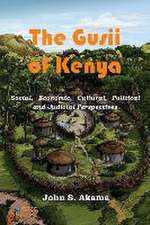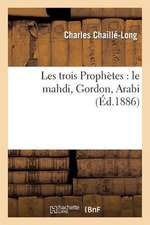War and Society in Colonial Zambia, 1939–1953: War and Militarism in African History
Autor Alfred Temboen Limba Engleză Paperback – 12 dec 2022
Written from a Zambian perspective, this leading study shows how the British colony of Northern Rhodesia (later Zambia) organized and deployed human, military, and natural resources during and after the Second World War. The Second World War brought unprecedented pressures to bear on Britain’s empire, which then included colonial Northern Rhodesia. Through new archival materials and oral histories, War and Society in Colonial Zambia tells—from an African perspective—the story of how the colony organized its human and natural resources on behalf of the imperial government. Alfred Tembo first examines government propaganda and recruitment of personnel for the Northern Rhodesia Regiment, which served in East Africa, Palestine, Ceylon, Burma, and India. Later, Zambia’s economic contribution to the Allied war effort would foreground the central importance of the colony’s mining industry as well as its role as supplier of rubber and beeswax following the fall of the Southeast Asian colonies to the Japanese in early 1942. Finally, Tembo presents archival and oral evidence about life on the home front, including the social impact of wartime commodity shortages, difficulties posed by incoming Polish refugees, and the more interventionist forms of colonial governance that these circumstances engendered.
Preț: 230.69 lei
Nou
Puncte Express: 346
Preț estimativ în valută:
44.14€ • 46.21$ • 36.52£
44.14€ • 46.21$ • 36.52£
Carte disponibilă
Livrare economică 17-31 martie
Livrare express 28 februarie-06 martie pentru 26.93 lei
Preluare comenzi: 021 569.72.76
Specificații
ISBN-13: 9780821425107
ISBN-10: 0821425102
Pagini: 256
Ilustrații: 2
Dimensiuni: 152 x 229 x 20 mm
Greutate: 0.39 kg
Editura: Ohio University Press
Colecția Ohio University Press
Seria War and Militarism in African History
ISBN-10: 0821425102
Pagini: 256
Ilustrații: 2
Dimensiuni: 152 x 229 x 20 mm
Greutate: 0.39 kg
Editura: Ohio University Press
Colecția Ohio University Press
Seria War and Militarism in African History
Recenzii
“In this first comprehensive study of Zambia during the Second World War, Alfred Tembo has produced a text that is both elegantly written and based upon meticulous and well-presented original research. Throughout, Tembo makes seamless linkages between the grand political/strategic levels and the ‘on the ground’ participation in the conflict of this important African colony. The accessibility of its presentation makes this book ideal for academics, historians, and general interest readers alike.”—Ashley Jackson, professor of imperial and military history, King's College London, and visiting fellow, Kellogg College, University of Oxford
“Alfred Tembo sheds light on how the Second World War affected Zambian society in this excellent study. Based on a close reading of hitherto underutilized Zambian archives, this book is essential reading for students and scholars with an interest in the effects of the war in a colonial context.”—Andrew Cohen, coauthor of Labour and Economic Change in Southern Africa, c.1900–2000: Zimbabwe, Zambia, and Malawi
“Historians, political scientists, economists, and general readers will certainly find this empirical study a treasure trove of information on the important contributions Africans made to the British war effort, not to mention the high price they paid for their participation in a conflict not of their own making.”—H-SAfrica, H-Net Reviews
Notă biografică
Alfred Tembo is a research associate with the University of the Free State International Studies Group and a lecturer in the Department of Historical and Archaeological Studies at the University of Zambia.
Descriere
The first major study of its kind, this book shows—from a Zambian perspective—how Northern Rhodesia, then a British colony, organized and deployed human, military, and natural resources during the Second World War. New research and oral histories further demonstrate the war’s social and industrial impact on Zambia in the immediate postwar period.
